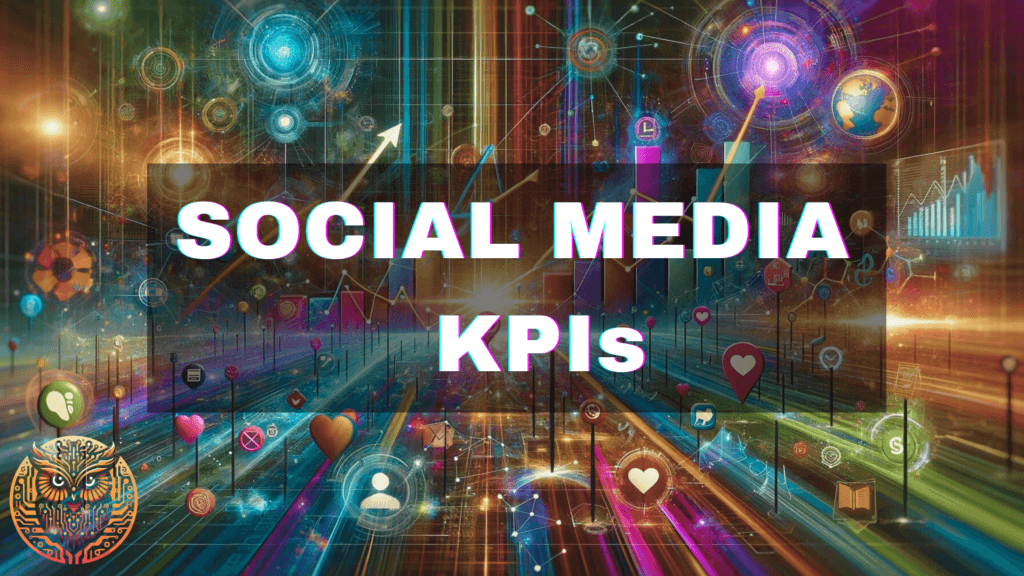The Power of Measurement: Tracking Social Media KPIs for Success
Social media has become an essential tool in today’s marketing. It allows businesses to connect directly with customers, build brand recognition, and drive sales. However, simply having a social media presence isn’t enough. To ensure your efforts are effective and generate a return on investment (ROI), you need to track and analyze your performance.
But how do you know if your efforts are paying off? This is where key performance indicators (KPIs) come in.
Understanding Your Impact: What are Social Media KPIs?
Imagine social media KPIs as your performance report card. They are measurable values that tell you how effectively your social media strategy is working. Here’s why KPIs are crucial:
- Evaluating Your Strategy: Social media KPIs provide a clear picture of how well your social media presence is functioning. They help you assess if your content resonates with your audience if your campaigns are achieving their goals, and if your overall strategy needs adjustments.
- Data-Driven Decisions: Social media platforms generate a vast amount of data. KPIs act as a filter, helping you focus on the information that truly matters. With these insights, you can make informed decisions about your content, audience targeting, and overall social media approach.
There’s a crucial difference between KPIs and metrics:
- Metrics: These are the raw data points you collect, like likes, comments, shares, follower growth, website clicks, and more. While metrics offer valuable information, they don’t tell the whole story.
- KPIs: Think of KPIs as the refined version of metrics. They take those raw data points and translate them into actionable insights specific to your goals. For example, a high number of likes might be a good metric, but a high like-to-comment ratio is a stronger KPI that indicates deeper audience engagement.
By focusing on the right KPIs, you can transform a sea of data into a roadmap for social media success. It allows you to refine your strategy and achieve your marketing objectives.
Key Social Media KPIs Categories
KPIs aren’t one-size-fits-all. To effectively measure your social media performance, you need to consider different categories with specific goals:
- Brand Awareness KPIs: These KPIs focus on how well your brand is recognized on social media. Think of them as measuring how visible your brand is in the online conversation.
- Engagement KPIs: Here, you’re interested in how users interact with your content. Engagement KPIs tell you if your content resonates with your audience and sparks conversations.
- Lead Generation KPIs: These KPIs measure how effective your social media is at attracting potential customers. They help you understand if your social media efforts are bringing in new leads for your business.
- Conversion KPIs: Finally, conversion KPIs track how many leads convert into actual sales or desired actions, like website visits or event registrations.
By tracking KPIs across these categories, you gain a comprehensive picture of your social media performance and how it contributes to your overall marketing goals.
Top Social Media KPIs to Track
Within each category, there are specific KPIs that can be tracked. Here are some key examples:
A. Brand Awareness KPIs
- Reach: This measures the number of unique users who saw your content.
- Impressions: This shows the total number of times your content was displayed, even if by the same user.
- Follower Growth: This tracks the increase in your follower base over time.
B. Engagement KPIs
- Likes, Comments, Shares: These measure basic user interaction and how much your content resonates with your audience.
- Click-Through Rate (CTR): This shows the percentage of users who clicked a link in your post, indicating their interest in learning more.
C. Lead Generation KPIs
- Lead Clicks: This tracks the number of users who clicked on a call to action (CTA) designed to generate leads, like a “Sign Up Now” button.
- Lead Forms Submitted: This shows the number of users who completed a lead capture form on your social media page.
- Mentions with Contact Information: This identifies brand mentions that include contact details like email addresses, indicating potential interest in your product or service.
D. Conversion KPIs
- Website Sales: This measures sales generated through traffic directed from your social media platforms.
- App Downloads: This tracks the number of app downloads driven by social media campaigns.
- Event Registrations: This shows the number of sign-ups for events promoted on social media.
Remember, the best KPIs for you depend on your specific business goals and social media strategy. By focusing on the right KPIs within each category, you can ensure your social media efforts are on track to achieve success.
Choosing the Right KPIs for Your Business
Not all KPIs are created equal. The best ones for you depend on your unique goals and social media strategy. Here’s why tailoring your KPIs is crucial:
- Alignment with Goals: Imagine your KPIs as a map leading to your desired destination. If your goal is brand awareness, tracking follower growth is more relevant than website sales. Choosing KPIs that directly connect to your goals ensures your social media efforts are moving you in the right direction.
- Targeted Strategy: Different social media strategies call for different KPIs. For example, a campaign focused on generating leads might prioritize lead clicks and form submissions, while a brand awareness campaign might focus on reach and impressions.
Here are some key factors to consider when selecting your KPIs:
- Industry: Benchmarks and success metrics can vary by industry. For example, an e-commerce business might prioritize conversion KPIs more heavily than a non-profit organization.
- Target Audience: Tailor your KPIs to the demographics and behavior of your ideal customer. Understanding their online habits can help you choose KPIs that reflect their engagement with your content.
- Campaign Objectives: Are you focused on brand awareness, lead generation, or driving sales? Clearly defined campaign objectives will guide your selection of the most relevant KPIs to track progress and measure success.
Mastering the Journey: Effective Social Media KPIs Tracking
Tracking KPIs isn’t just about collecting data; it’s about using it to improve your social media performance. Here are some practical tips:
- Set SMART Goals: Specific, Measurable, Achievable, Relevant, and Time-bound goals will help you define success and choose the right KPIs to track it.
- Monitor Progress Regularly: Don’t wait until the end of the campaign. Use social media analytics tools to monitor your KPIs frequently and identify trends.
- Analyze Data and Adapt: The real magic lies in interpreting your data. Look for patterns, understand what’s working (and what’s not), and refine your strategy accordingly.
Social media analytics tools are essential for effective KPI tracking. These tools provide insightful data visualizations and simplify the process of monitoring progress. By leveraging these tools, you can gain a deeper understanding of your social media performance and make data-driven decisions that optimize your campaigns and help you achieve your marketing goals.
A Look Ahead: Emerging Social Media KPIs
Social media is constantly evolving, and so are the KPIs that measure success. Here are some emerging trends to keep an eye on:
- Social Listening & Sentiment Analysis: Understanding brand perception and audience sentiment is becoming increasingly important. KPIs that track social media conversations and analyze the emotional tone can help you refine your messaging and build stronger relationships with your audience.
- Social Commerce Conversion Rates: As social media platforms integrate more shopping features, measuring the effectiveness of direct sales becomes crucial. KPIs like conversion rates from social media clicks to product purchases will be increasingly important for businesses leveraging social commerce.
- Influencer Marketing Engagement: Partnering with influencers can be a powerful social media strategy. However, simply measuring the follower count isn’t enough. KPIs that track the reach, engagement, and conversions generated by influencer partnerships will provide a more comprehensive picture of their effectiveness.
By staying informed about emerging KPIs, you can ensure your social media strategy remains relevant and continues to deliver results for your business.
Conclusion
Social media offers a powerful platform to connect with customers, build brand awareness, and drive sales. By tracking the right Social Media KPIs, you gain valuable insights into how your content performs, how your audience engages, and ultimately, how well your social media strategy aligns with your overall marketing goals. By using these KPIs as your compass, you can refine your approach, optimize your campaigns, and steer your social media efforts toward success.
Frequently Asked Questions (FAQs) about Social Media KPIs
Why are Social Media KPIs important? Social media KPIs act like a report card, giving you insights into how well your social media presence is functioning and allowing you to make data-driven decisions about your content and strategy.
What’s the difference between metrics and KPIs? Metrics are raw data points like likes and comments, while KPIs are refined versions that translate those metrics into actionable insights specific to your goals. For example, a high like-to-comment ratio is a stronger KPI than just a high number of likes.
What are the main categories of Social Media KPIs? There are four main categories: Brand Awareness (reach, impressions, follower growth), Engagement (likes, comments, shares, CTR), Lead Generation (lead clicks, form submissions, mentions with contact info), and Conversion (website sales, app downloads, event registrations).
How do I choose the right KPIs for my business? The best KPIs depend on your specific goals and social media strategy. Consider factors like your industry, target audience, and campaign objectives. If brand awareness is your goal, track follower growth. If it’s sales, focus on conversion KPIs.
What are some tips for effective Social Media KPI tracking? Set SMART goals (Specific, Measurable, Achievable, Relevant, Time-bound) to define success and choose relevant KPIs. Monitor your progress regularly using social media analytics tools. Analyze your data to identify trends, understand what’s working, and adapt your strategy accordingly.
Can you give some examples of Brand Awareness KPIs? Reach (number of unique users who saw your content), Impressions (total number of times your content was displayed), Follower Growth (increase in your follower base over time).
What about Engagement KPIs? These measure user interaction with your content: Likes, Comments, Shares show how much your content resonates with your audience. Click-Through Rate (CTR) indicates their interest in learning more by clicking a link in your post.
How can I track Lead Generation through Social Media? Look at Lead Clicks (number of users who clicked on a call to action to generate leads), Lead Forms Submitted (number of users who completed a lead capture form), and Mentions with Contact Information (brand mentions that include contact details).
What are some Conversion KPIs to focus on? These track how many leads convert into desired actions: Website Sales (sales generated from social media traffic), App Downloads driven by social media campaigns, and Event Registrations from social media promotion.
Are there any emerging trends in Social Media KPIs? Yes! Social Listening & Sentiment Analysis helps understand brand perception and audience sentiment. Social Commerce Conversion Rates are becoming crucial as social media platforms integrate more shopping features. Influencer Marketing Engagement goes beyond follower count, focusing on reach, engagement, and conversions generated by influencer partnerships.




